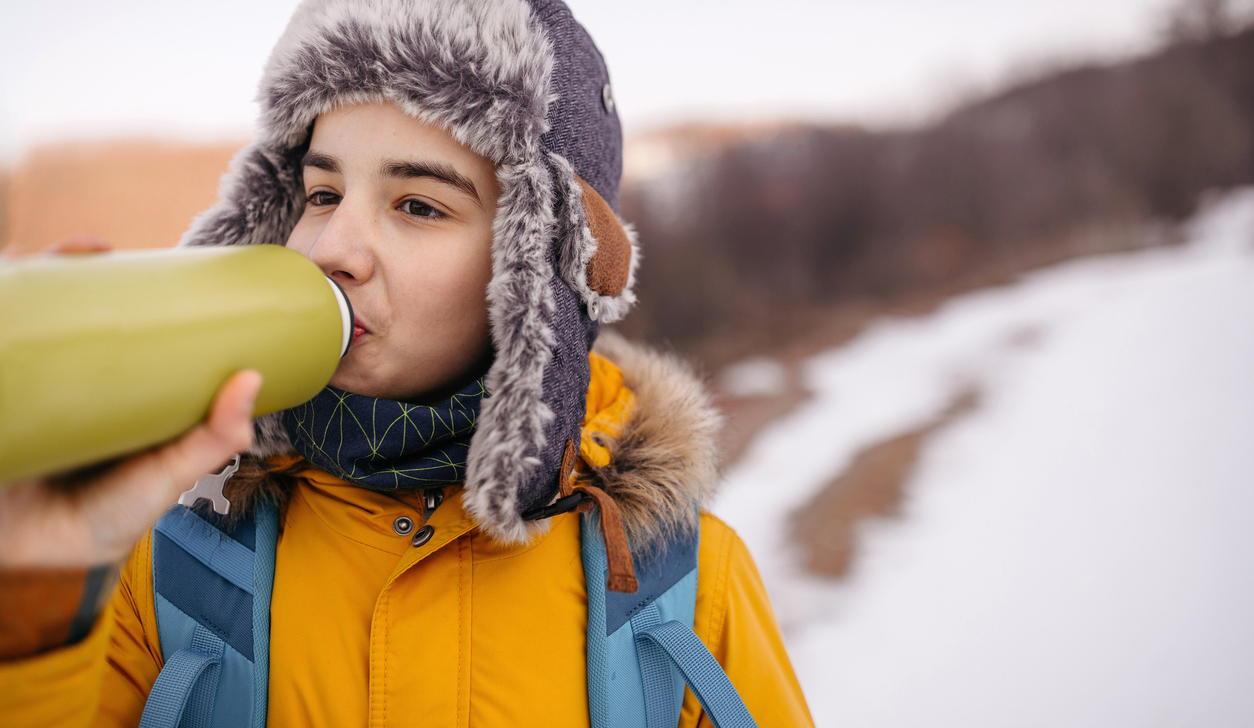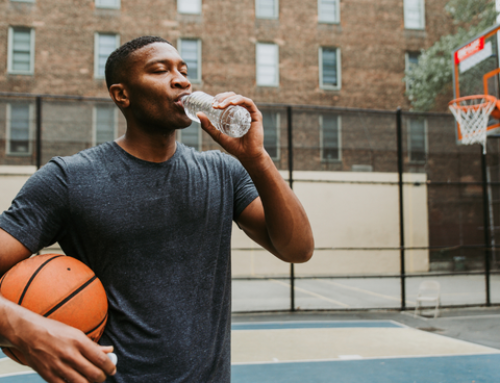Hydration for Successful Sports Performance

As bright gym lights beat down on you during practice, sweat drips from your brow and a vision of ice-cold sugary lemonade appears before you—remember that what you drink before, during and after practice or a game greatly affects your performance. Temperature, altitude, duration and intensity all impact your hydration status as well.
We sweat to cool our bodies; however, we must replenish the fluids we lose. The average couch potato excretes 32 ounces of sweat per day, just through his feet. Athletes lose more than this, but since sweat evaporates, they don’t always recognize it. Even when temperatures plummet during the winter months, we still lose fluids.
Dehydration can greatly hinder performance, causing fatigue, cramping and headaches. Fatigue can cause slower sprints, shorter jumps, faulty pivots and delayed reaction time. According to research at Penn State University, adult basketball players can experience up to a six percent decrease in shooting percentage and a seven percent decrease in sprint times when they are dehydrated just two percent [the equivalent of a four pound deficit for a 200-pound player]. Furthermore, performance is impacted whether dehydration occurs before or during play.
Common tips for staying hydrated include drinking two liters [68 ounces] of water daily and consuming a cup of water or a sports drink 15 to 30 minutes before a game and throughout it when possible. Ensure that the water is cold. The colder the fluid, the more quickly it is absorbed and taken up to the muscles. Also, gulping is better than sipping—it will be absorbed faster. Check your urine color. If it’s clear to pale yellow, you are in a hydrated state. Dark yellow or brownish color definitely means dehydration.
The type of sports drink is also important. Electrolytes [e.g., sodium and potassium] are lost through sweating, and the loss may cause cramping. To maintain adequate blood sugar levels, make sure your sports drink [e.g., G2] contains at least a two percent carbohydrate load. Consuming a sports drink with some carbohydrate is important, because our brains function on carbohydrate. The brain needs carbohydrate to keep mental status up to par during a game. Not only will it fuel the brain, it will also fuel the body’s muscles.
Not all drinks are created equal, though, depending on the sport. For higher intensity sports, opt for standard sports drinks. Low-intensity sports such as baseball or golf call for sports drinks that are low in calories but offer sufficient electrolytes.
Regular sodas or smoothies contain a lot of sugar [up to 17 packets of sugar per bottle]. If you drink something with too much carbohydrate, you will slow water absorption, creating “sloshing” in the stomach. Keep in mind that sports drinks should be consumed during exercise—not as a drink replacement with meals or if you’re just thirsty.
Jenna Stranzl is a registered dietitian who currently serves as sports nutritionist for Major League Strength, the Taylor Hooton Foundation and as consulting R.D. to the Philadelphia Flyers. Her prior experience includes IMG Academies in Bradenton, Fla., Athletes’ Performance, the Penn State Sports Nutrition Clinic and Wyeth Nutrition/Pharmaceuticals. In addition, Stranzl has contributed to MLB’s RBI Program [Reviving Baseball in Inner Cities], NFL pre-Combine training and professional baseball organizations. She is a graduate of Penn State University.
RECOMMENDED FOR YOU
MOST POPULAR
Hydration for Successful Sports Performance

As bright gym lights beat down on you during practice, sweat drips from your brow and a vision of ice-cold sugary lemonade appears before you—remember that what you drink before, during and after practice or a game greatly affects your performance. Temperature, altitude, duration and intensity all impact your hydration status as well.
We sweat to cool our bodies; however, we must replenish the fluids we lose. The average couch potato excretes 32 ounces of sweat per day, just through his feet. Athletes lose more than this, but since sweat evaporates, they don’t always recognize it. Even when temperatures plummet during the winter months, we still lose fluids.
Dehydration can greatly hinder performance, causing fatigue, cramping and headaches. Fatigue can cause slower sprints, shorter jumps, faulty pivots and delayed reaction time. According to research at Penn State University, adult basketball players can experience up to a six percent decrease in shooting percentage and a seven percent decrease in sprint times when they are dehydrated just two percent [the equivalent of a four pound deficit for a 200-pound player]. Furthermore, performance is impacted whether dehydration occurs before or during play.
Common tips for staying hydrated include drinking two liters [68 ounces] of water daily and consuming a cup of water or a sports drink 15 to 30 minutes before a game and throughout it when possible. Ensure that the water is cold. The colder the fluid, the more quickly it is absorbed and taken up to the muscles. Also, gulping is better than sipping—it will be absorbed faster. Check your urine color. If it’s clear to pale yellow, you are in a hydrated state. Dark yellow or brownish color definitely means dehydration.
The type of sports drink is also important. Electrolytes [e.g., sodium and potassium] are lost through sweating, and the loss may cause cramping. To maintain adequate blood sugar levels, make sure your sports drink [e.g., G2] contains at least a two percent carbohydrate load. Consuming a sports drink with some carbohydrate is important, because our brains function on carbohydrate. The brain needs carbohydrate to keep mental status up to par during a game. Not only will it fuel the brain, it will also fuel the body’s muscles.
Not all drinks are created equal, though, depending on the sport. For higher intensity sports, opt for standard sports drinks. Low-intensity sports such as baseball or golf call for sports drinks that are low in calories but offer sufficient electrolytes.
Regular sodas or smoothies contain a lot of sugar [up to 17 packets of sugar per bottle]. If you drink something with too much carbohydrate, you will slow water absorption, creating “sloshing” in the stomach. Keep in mind that sports drinks should be consumed during exercise—not as a drink replacement with meals or if you’re just thirsty.
Jenna Stranzl is a registered dietitian who currently serves as sports nutritionist for Major League Strength, the Taylor Hooton Foundation and as consulting R.D. to the Philadelphia Flyers. Her prior experience includes IMG Academies in Bradenton, Fla., Athletes’ Performance, the Penn State Sports Nutrition Clinic and Wyeth Nutrition/Pharmaceuticals. In addition, Stranzl has contributed to MLB’s RBI Program [Reviving Baseball in Inner Cities], NFL pre-Combine training and professional baseball organizations. She is a graduate of Penn State University.











